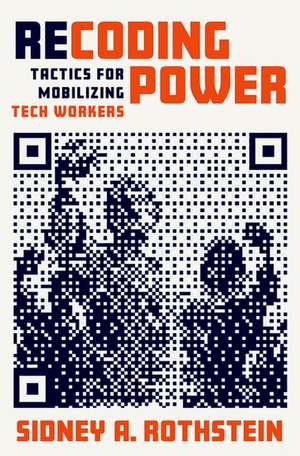Recoding Power: Tactics for Mobilizing Tech Workers
Autor Sidney A. Rothsteinen Limba Engleză Hardback – 20 iun 2023
Preț: 329.28 lei
Preț vechi: 417.84 lei
-21% Nou
Puncte Express: 494
Preț estimativ în valută:
63.03€ • 68.49$ • 52.98£
63.03€ • 68.49$ • 52.98£
Carte disponibilă
Livrare economică 20-26 martie
Preluare comenzi: 021 569.72.76
Specificații
ISBN-13: 9780197612873
ISBN-10: 0197612873
Pagini: 288
Ilustrații: 24 Tables & Figures
Dimensiuni: 237 x 163 x 24 mm
Greutate: 0.54 kg
Editura: Oxford University Press
Colecția OUP USA
Locul publicării:New York, United States
ISBN-10: 0197612873
Pagini: 288
Ilustrații: 24 Tables & Figures
Dimensiuni: 237 x 163 x 24 mm
Greutate: 0.54 kg
Editura: Oxford University Press
Colecția OUP USA
Locul publicării:New York, United States
Recenzii
Recoding Power combines sustained theoretical analysis with rigorous empirical research, providing valuable insights and an optimistic vitality to understanding how tech workers can oppose layoffs and build worker power. Accordingly, I strongly recommend this book to all scholars and graduate students interested in reducing power inequality in the workplace and in society.
Tech workers are often seen as the winners in the transition to a digital economy. But they can also be among the most precarious. In Recoding Power, Sidney Rothstein shows that the key is recoding management discourse. This innovative book draws on intensive fieldwork at US (IBM) and German (Siemens, Infineon) case study firms to explain why workers succeeded or failed to challenge layoffs in two very different institutional settings. It makes a major contribution to theorizing the changing sources of worker power in increasingly liberalized 'varieties of capitalism', while holding important lessons for labor unions seeking to organize and represent the expanding high tech workforce.
Rothstein offers an original and compelling account of how workers can successfully exercise power. Building a theory of worker power that rests upon discursive creativity rather than institutional resources, and using comparative case studies of the tech industry, this book will reshape how we think about the future of labor organizing.
This is a very timely and elegantly written book on the capacity of contemporary tech workers to exercise collective agency with their employers, defend their jobs and, at least potentially, rebuild a labor movement in our time. By weaving innovative theoretical argument together with lucid and granular empirical reconstructions of labor struggles in Germany and the United States, Recoding Power develops an astonishingly hopeful account of contemporary labor possibilities in the modern digital economy.
Tech workers are often seen as the winners in the transition to a digital economy. But they can also be among the most precarious. In Recoding Power, Sidney Rothstein shows that the key is recoding management discourse. This innovative book draws on intensive fieldwork at US (IBM) and German (Siemens, Infineon) case study firms to explain why workers succeeded or failed to challenge layoffs in two very different institutional settings. It makes a major contribution to theorizing the changing sources of worker power in increasingly liberalized 'varieties of capitalism', while holding important lessons for labor unions seeking to organize and represent the expanding high tech workforce.
Rothstein offers an original and compelling account of how workers can successfully exercise power. Building a theory of worker power that rests upon discursive creativity rather than institutional resources, and using comparative case studies of the tech industry, this book will reshape how we think about the future of labor organizing.
This is a very timely and elegantly written book on the capacity of contemporary tech workers to exercise collective agency with their employers, defend their jobs and, at least potentially, rebuild a labor movement in our time. By weaving innovative theoretical argument together with lucid and granular empirical reconstructions of labor struggles in Germany and the United States, Recoding Power develops an astonishingly hopeful account of contemporary labor possibilities in the modern digital economy.
Notă biografică
Sidney A. Rothstein is Assistant Professor of Political Science at Williams College. He has published in the British Journal of Industrial Relations, German Politics, Perspectives on Politics, Review of International Political Economy, Socio-Economic Review, and Studies in American Political Development, and co-edited (with Tobias Schulze-Cleven) Imbalance: Germany's Political Economy After the Social Democratic Century (Routledge, 2021).
